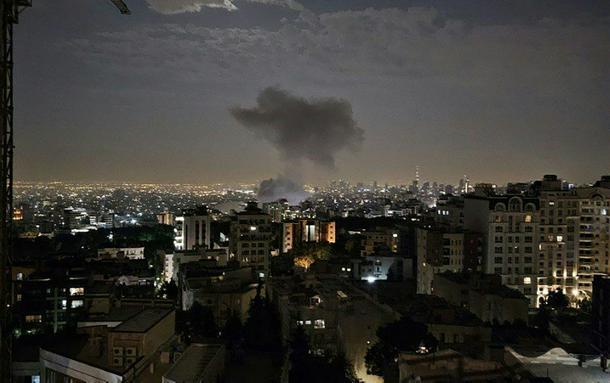
A photo by Iran's Revolutionary Guard Corps (IRGC) official Sepah News Telegram channel on June 13, 2025 shows smoke billowing from a site reportedly targeted by an Israeli strike in the Iranian capital Tehran
Tehran (AFP) - Israel carried out strikes against Iran on Friday, targeting its nuclear and military sites, and killing the head of Iran’s Revolutionary Guards and top nuclear scientists.
Iran’s Supreme Leader Ayatollah Ali Khamenei warned Israel it faced a “bitter and painful” fate over the attack, which also killed a senior Guards commander according to Iranian media.
The United States underlined that it was not involved in the Israeli action, and warned Tehran not to attack its personnel or interests.
Israel’s operation struck at the “heart of Iran’s nuclear enrichment programme”, taking aim at the atomic facility in Natanz and nuclear scientists, Prime Minister Benjamin Netanyahu said.
The operation against Iran will “continue as many days as it takes,” Netanyahu said.
Iran’s Revolutionary Guards leader Hossein Salami was killed in the strikes, said Iranian media Tasnim.
Iran’s Chief of Staff Mohammad Bagheri was also “likely eliminated”, said an Israeli security official.
Iranian state media said residential buildings in Tehran were hit as well, killing a number of civilians including women and children.
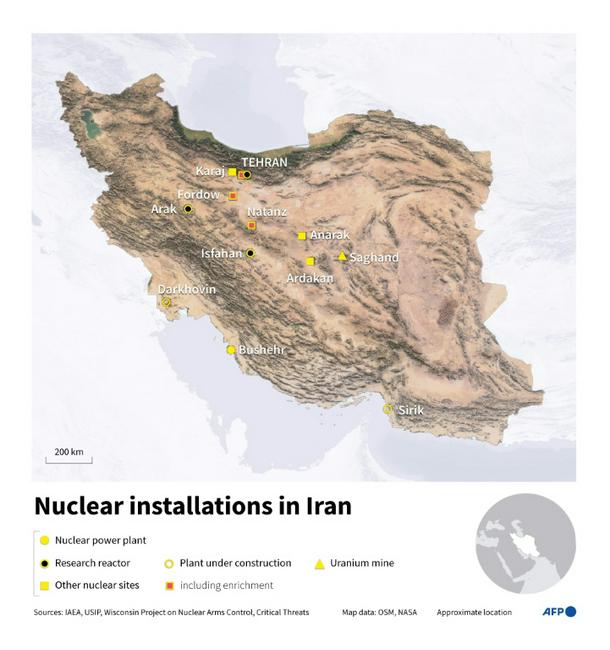
Nuclear installations in Iran
Air traffic was halted at Tehran’s main international airport Imam Khomeini, while neighbouring Iraq has also closed its airspace and suspended all flights at all airports, state media reported.
Israel declared a state of emergency, likewise closing its airspace, with Defence Minister Israel Katz anticipating retaliatory action from Tehran.
“Following the State of Israel’s preemptive strike against Iran, a missile and drone attack against the State of Israel and its civilian population is expected in the immediate future,” Katz said.
An Israeli military official added that the Israeli army believed that Iran had the ability to strike Israel “any minute”.
- ‘Might blow’ deal -
Oil prices surged 12 percent while stocks sank on the Israeli strikes, which came after US President Donald Trump’s warning of a “massive conflict” in the region.
Trump had also said the United States was drawing down staff in the Middle East, after Iran threatened to target US military bases in the region if conflict breaks out.
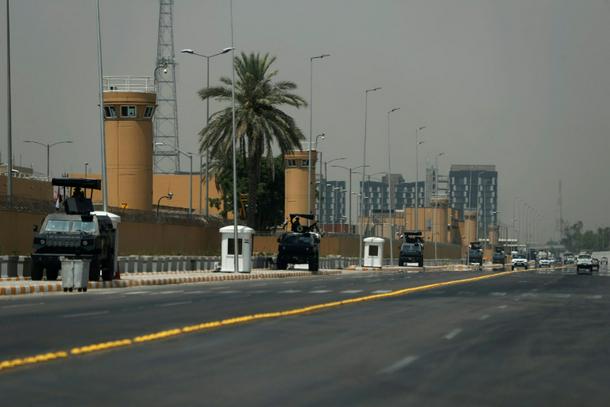
Iraqi Counter Terrorism Forces are deployed outside the US embassy in Baghdad's Green Zone on June 12, 2025, after an announcement by the US that staff levels at the diplomatic mission would be reduced
“I don’t want to say imminent, but it looks like it’s something that could very well happen,” Trump told reporters at the White House Thursday when asked if an Israeli attack loomed.
Trump said he believed a “pretty good” deal on Iran’s nuclear programme was “fairly close”, but said that an Israeli attack on its arch foe could wreck the chances of an agreement.
The US leader did not disclose the details of a conversation on Monday with Netanyahu, but said: “I don’t want them going in, because I think it would blow it.”
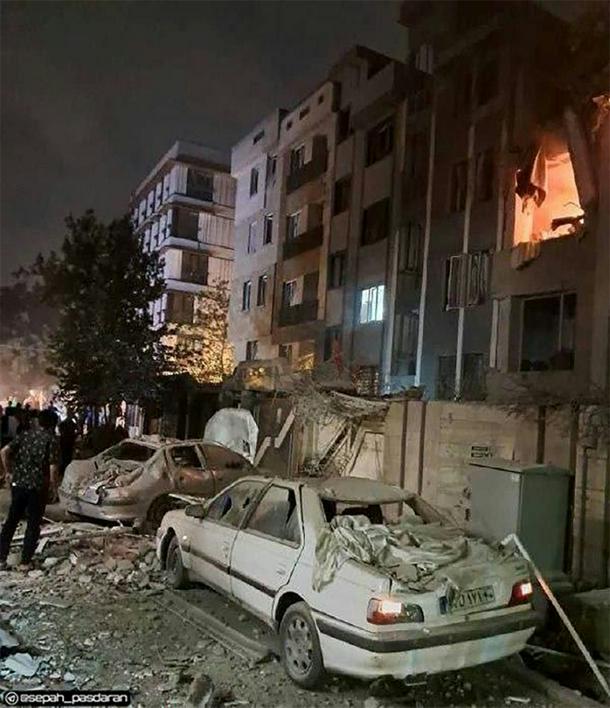
This handout photo released by Iran's Revolutionary Guard Corps (IRGC) official Sepah News Telegram channel on June 13, 2025 reportedly shows a building in Tehran hit in an Israeli strike
Trump quickly added: “Might help it actually, but it also could blow it.”
Secretary of State Marco Rubio warned Iran not respond to Israeli strikes by hitting US bases, saying Washington was not involved.
“Let me be clear: Iran should not target US interests or personnel,” Rubio said in a statement.
Prior to Friday’s attack, Iran had threatened to hit US bases in the Middle East if conflict were to erupt.
“All its bases are within our reach, we have access to them, and without hesitation we will target all of them in the host countries,” Iran’s Defence Minister Aziz Nasirzadeh said this week.
Following Israel’s strikes, the UN’s nuclear watchdog said it was “closely monitoring” the situation.
“The agency is in contact with Iranian authorities regarding radiation levels. We are also in contact with our inspectors in the country,” International Atomic Energy Agency head Rafael Grossi said.
- ‘Extremist’ -
Israel, which counts on US military and diplomatic support, sees Iran as an existential threat and hit its air defences last year.
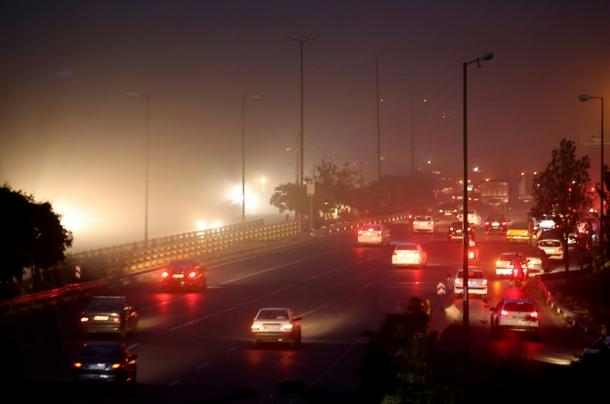
Traffic flows on a highway in the Iranian capital Tehran following Israeli strikes
Netanyahu has vowed less restraint since the unprecedented October 7, 2023 attack on Israel by Tehran-backed Hamas, which triggered the massive Israeli offensive in Gaza.
Since the Hamas attack, Iran and Israel have traded direct attacks for the first time.
The United States and other Western countries, along with Israel, have repeatedly accused Iran of seeking a nuclear weapon, which it has repeatedly denied.
Israel again called for global action after the IAEA accused Iran on Wednesday of non-compliance with its obligations.
The agency’s resolution could lay the groundwork for European countries to invoke a “snapback” mechanism, which expires in October, that would reinstate UN sanctions eased under a 2015 nuclear deal negotiated by then US president Barack Obama.
Trump pulled out of the deal in his first term and slapped Iran with sweeping sanctions.
Iran’s nuclear chief, Mohammad Eslami, slammed the resolution as “extremist” and blamed Israeli influence.
In response to the resolution, Iran said it would launch a new enrichment centre in a secure location.
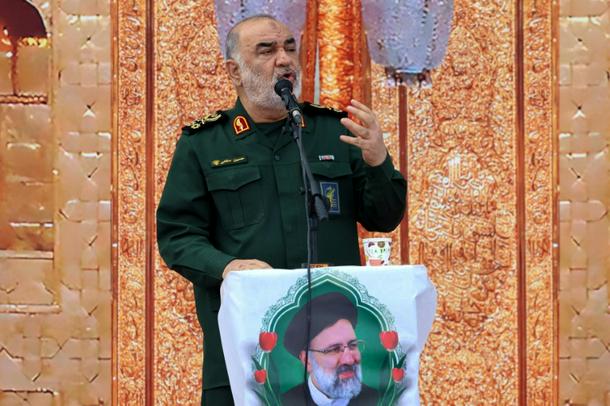
Head of Iranian revolutionary guard corps (IRGC) Hossein Salami was killed in the Israeli strikes, Iranian media reports
Iran currently enriches uranium to 60 percent, far above the 3.67-percent limit set in the 2015 deal and close, though still short, of the 90 percent needed for a nuclear warhead.